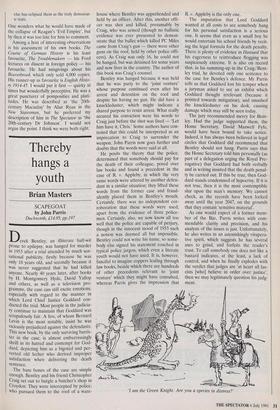Thereby hangs a youth
Brian Masters
Derek Bentley, an illiterate half-wit prone to epilepsy, was hanged for murder in 1953 after a trial attended by much sen- sational publicity, firstly because he was only 18 years old, and secondly because it was never suggested that he had killed anyone. Nearly 40 years later, after books by H. Montgomery Hyde, David Yallop and others, as well as a television pro- gramme, the case can still excite emotions, especially with regard to the manner in which Lord Chief Justice Goddard con- ducted the trial. Most people in the judicia- ry continue to maintain that Goddard was scrupulously fair. A few, of whom Bernard Levin is the most notable, insist he was viciously prejudiced against the defendants. This new book, by the only surviving barris- ter in the case, is almost embarrassingly shrill in its hatred and contempt for God- dard, depicting him as a bigoted and per- verted old lecher who derived improper satisfaction when delivering the death sentence.
The bare bones of the case are simple enough. Bentley and his friend Christopher Craig set out to burgle a butcher's shop in Croydon. They were intercepted by police, Who pursued them to the roof of a ware-
house where Bentley was apprehended and held by an officer. After this, another offi- cer was shot and killed, presumably by Craig, who was armed (though no ballistic evidence was ever presented to demon- strate that the bullet which killed PC Miles came from Craig's gun — there were other guns on the roof, held by other police offi- cers). As Craig was only 16, he could not be hanged, but was detained for some years and now lives in the country. The author of this book was Craig's counsel.
Bentley was hanged because it was held that he was party to the 'joint venture' whose purpose continued even after his arrest and detention on the roof and despite his having no gun. He did have a knuckleduster, which might indicate a shared purpose to resist arrest. What really secured his conviction were his words to Craig just before the shot was fired — him have it, Chris.' Some authors have con- tested that this could be interpreted as an imprecation to Craig to surrender the weapon, John Parris now goes further and doubts that the words were said at all.
He posits the theory that the police, determined that somebody should pay for the death of their colleague, pored over law books and found a precedent in the case of R. v. Appleby, in which the very same words were uttered by another defen- dant in a similar situation; they lifted these words from the former case and fraud- ulently placed them in Bentley's mouth. Certainly, there was no independent cor- roboration that these words were used, apart from the evidence of three police- men. Certainly, also, we now know all too well that the police are capable of perjury, though in the innocent mood of 1953 such a notion was deemed all but impossible. Bentley could not write his name, so some- body else signed his statement couched in typical police jargon, which even a literate youth would not have used. It is, however, fanciful to imagine coppers leafing through law books, beside which there are hundreds of other precedents relevant to 'joint venture' which they might have consulted, whereas Parris gives the impression that R. v. Appleby is the only one.
The imputation that Lord Goddard wanted at all costs to see somebody hang for his personal satisfaction is a serious one. It seems that even as a small boy he would entertain his school friends by recit- ing the legal formula for the death penalty. There is plenty of evidence in Hansard that his eagerness to reintroduce flogging was suspiciously extreme. It is also on record that, in his summing-up in the Craig/Bent- ley trial, he devoted only one sentence to the case for Bentley's defence, Mr Parris tells us that Goddard lost his temper when a juryman asked to see an exhibit which Goddard thought irrelevant (because it pointed towards mitigation), and smashed the knuckleduster on his desk, causing damage which may still be seen today.
The jury recommended mercy for Bent- ley. Had the judge supported them, the Home Secretary, David Maxwell Fyfe, would have been bound to take notice. Indeed, it has always been believed in legal circles that Goddard did recommend that Bentley should not hang. Parris says that the Home Secretary told him personally (as part of a delegation urging the Royal Pre- rogative) that Goddard had both verbally and in writing insisted that the death penal- ty be carried out. If this be true, then God- dard stands condemned of hypocrisy. If it is not true, then it is the most contemptible slur upon the man's memory. We cannot check, as the records have been locked, away until the year 2047, on the grounds that they contain 'sensitive material'.
As one would expect of a former mem- ber of the Bar, Parris writes with com- mendable clarity and precision, and his analysis of the issues is just, Unfortunately, he also writes in an astonishingly vitupera- tive spirit, which suggests he has several axes to grind, and forfeits the reader's trust. To call somebody one does not like a bastard indicates, at the least, a lack of control, and when he finally explodes with the verdict that judges are 'at heart all fas- cists [who] believe in order over justice', then we may legitimately question his judg- ment.
7 am the Green Knight. Are you a species in distress?'


















































 Previous page
Previous page